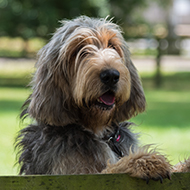
Breed must soon be DNA tested for Glazmann's thrombasthenia.
The Kennel Club has announced that all imported otterhounds must soon be DNA tested for Glanzmann's thrombasthenia before registration of their progeny is accepted.
The restriction, which follows consultation with the otterhound breed health coordinator, comes into effect on the 1 January 2021.
First identified in Otterhounds in the 1960s, Glanzmann's thrombasthenia is a rare blood clotting disorder that causes bleeding from the gums and prolonged bleeding during surgery. While the disease is rare in the UK, most known cases occur in the US breed population.
Because the global population of otterhounds is so small, genetic diversity can only be maintained by making use of available breeding animals from overseas. The Kennel Club says that restrictions are being introduced to prevent the introduction of the condition into the UK population 'while allowing breeders to make use of valuable genes from dogs originating outside of the country'.
Dr Tom Lewis, genetics and research manager at The Kennel Club, said: “The Kennel Club constantly reviews DNA testing schemes in conjunction with breed clubs to ensure that breeders are supported with resources which help them to make responsible breeding decisions.
“We work alongside breed clubs and breed health coordinators in a collaborative effort to improve the health of pedigree dogs and are happy to accommodate a breed's request to tailor restrictions for a DNA test, for breeds which fit a number of suitable criteria. A formal request from the Breed Health Coordinator or a majority request from the breed clubs is normally required to do this.”
The otterhound is classed as a Kennel Club Vulnerable British Breed, a category for breeds which generate 300 of fewer registrations in a year. In 2019, just 44 otterhound puppies were registered with the Kennel Club, with none so far in 2020, making them one of Britain's rarest breeds.
In addition to imported otterhounds, the new measures also apply to overseas sires being used in a breeding programme (including AI).



 The Veterinary Medicines Directorate (VMD) is inviting applications from veterinary students to attend a one-week extramural studies (EMS) placement in July 2026.
The Veterinary Medicines Directorate (VMD) is inviting applications from veterinary students to attend a one-week extramural studies (EMS) placement in July 2026.